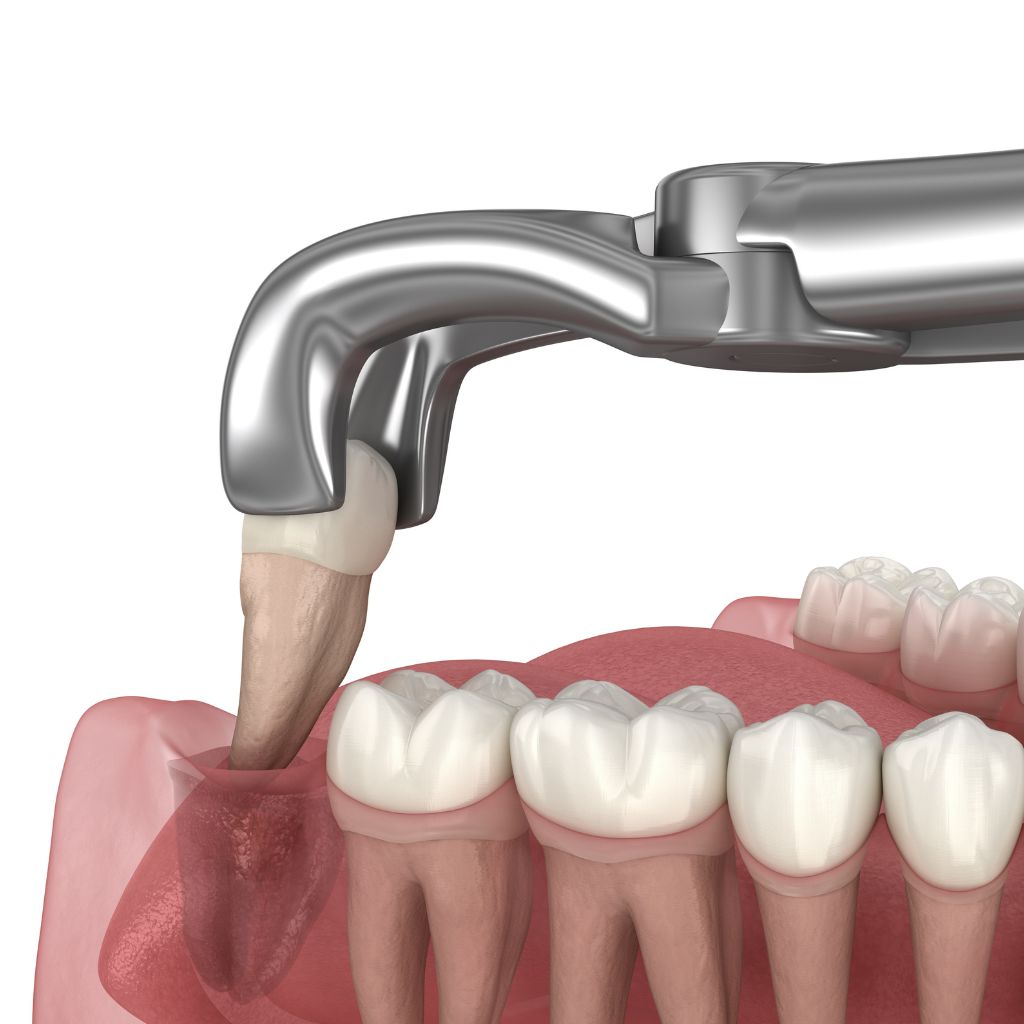Wisdom Teeth Removal in St. Augustine, FL
Safe, comfortable extraction of problematic third molars with specialized surgical expertise
Don't wait until wisdom teeth cause pain or damage. Proactive management can prevent complications and provide peace of mind.
What Is Wisdom Teeth Removal?
Wisdom teeth removal is a specialized oral surgery procedure that extracts the third molars—the final set of molars that typically emerge between ages 17-25. These teeth often require removal because modern jaws frequently lack sufficient space to accommodate them properly, leading to partial eruption, impaction within the jawbone, or problematic positioning that can damage adjacent teeth and create various complications.
The removal process varies based on each tooth’s specific position and development. Some wisdom teeth may be visible in the mouth and accessible to relatively straightforward extraction techniques, while others—particularly impacted teeth—may be partially or completely encased in jawbone, requiring more sophisticated surgical approaches for safe removal. The appropriate technique depends on factors like the tooth’s angulation, root development, and relationship to surrounding anatomical structures.
As a board-certified oral and maxillofacial surgeon, Dr. Johnson has advanced training specifically focused on the management of complex wisdom tooth cases. His specialized expertise includes safe removal of deeply impacted teeth, extraction of teeth in close proximity to nerves or sinuses, and management of wisdom teeth with unusual developmental patterns or complications. This advanced training ensures optimal outcomes even for the most challenging wisdom tooth situations.

Dr. Douglas L. Johnson, DMD
With over 25 years of specialized experience, Dr. Johnson provides exceptional care using the latest techniques and technology.
Dr. Johnson is a board-certified oral and maxillofacial surgeon who completed his education at the University of Pittsburgh School of Dental Medicine and advanced training through fellowships at prestigious institutions. His extensive training and experience allow him to perform complex procedures with precision and care.
At our state-of-the-art facility, we prioritize your comfort and results. Dr. Johnson and his specially trained staff are committed to providing you with the highest standard of care in a welcoming environment.

What are the Benefits of Specialized Wisdom Teeth Removal?
Specialized wisdom teeth removal offers significant advantages that enhance both your immediate experience and long-term oral health. The primary benefit is the expertise in managing complex extractions—wisdom teeth often develop in challenging positions near vital structures like nerves, sinuses, or adjacent tooth roots. Specialized surgical training allows for precise removal that minimizes risks while ensuring complete extraction, even in difficult cases.
From a comfort perspective, specialized care provides optimal pain management through advanced anesthesia options including IV sedation that allows you to sleep comfortably through the entire procedure. This comprehensive approach to comfort is particularly valuable for anxious patients or those with multiple impacted teeth requiring extended surgical time. Most patients report that the experience was much more comfortable than they anticipated due to these specialized sedation capabilities.
Proactive removal of wisdom teeth before they cause problems delivers substantial preventive benefits. Research consistently shows that early extraction—typically during late teens to early twenties—results in faster healing, fewer complications, and prevention of potentially serious issues like cysts, tumors, infection, or damage to adjacent healthy teeth. This prevention-focused approach protects both your oral health and your wallet by avoiding the more complex procedures and additional treatments often required when wisdom teeth problems are addressed reactively.
For parents of teenagers, specialized wisdom teeth care provides valuable peace of mind. Knowing that your child’s extraction is being performed by a surgeon with the highest level of training and experience creates confidence in both the immediate surgical outcome and the long-term benefits of appropriate third molar management. Many parents appreciate that this important procedure can be completed safely during school breaks, allowing recovery during convenient timeframes.
Our Reviews
Why Patients Choose Us
Care and Commitment
From the front office to the exam room, our practice is made up of professionals who take your oral health very seriously. Using state-of-the-art equipment designed with safety and efficiency in mind, we are able to offer top-notch care. As you walk through our office, you will notice that everything is clean, comfortable and thoroughly sterilized. Your safety and comfort are our priority.
Honesty and Affordability
We know that the cost of care can be confusing. In addition to offering a number of in-office payment options to fit your budget, we also give you up-front cost information on your treatment ahead of time. We are in network with a variety of insurance plans, and we offer dental financing with credit available in time frames that fit your needs. We are happy to help you navigate your dental insurance and alternative payment options.
Comprehensive Oral Surgery Care in One Location
At our practice, we are qualified to handle all aspects of your oral and maxillofacial care, so you are always surrounded by people that you trust. If we must refer out, we promise to send you to carefully vetted colleagues who apply the same professional principles in their office that we do in ours.
Frequently Asked Questions
When Is the Best Time to Have Wisdom Teeth Removed?
For most patients, the optimal time for wisdom teeth removal is during the late teens to early twenties, typically between ages 17-25. During this period, root development is often incomplete, making extraction technically easier with fewer complications and faster healing. Additionally, younger patients generally recover more quickly and with fewer post-operative issues than older adults. Early evaluation around age 16-17 allows for monitoring of development patterns and appropriate timing recommendations. However, the ideal timing varies based on individual development, with some patients benefiting from earlier or later intervention based on their specific situation and wisdom tooth development patterns.
What Type of Anesthesia Is Used for Wisdom Teeth Removal?
We offer several anesthesia options tailored to your specific needs and anxiety level: local anesthesia, which numbs only the surgical area while you remain fully awake; nitrous oxide (laughing gas) combined with local anesthesia to reduce anxiety while maintaining consciousness; oral sedation that creates a deeply relaxed state with reduced awareness; and IV sedation, our most common approach, which creates a sleep-like state with little to no awareness or memory of the procedure. Dr. Johnson will discuss these options during your consultation, considering factors like the complexity of your extractions, your anxiety level, and your personal preferences to determine the most appropriate approach for your comfort.
What Is the Recovery Like After Wisdom Teeth Removal?
Most patients experience moderate swelling and discomfort for the first 2-3 days, gradually improving over the first week. Initial recovery milestones typically include: first 24 hours focused on clot formation and initial healing with soft foods and limited activity; days 2-3 usually representing peak swelling and discomfort, managed with prescribed medications and cold therapy; days 4-7 bringing noticeable improvement in comfort and function, with gradual return to normal activities; and complete tissue healing occurring over 2-3 weeks. Most patients can return to school or work within 3-5 days, though strenuous activity and exercise should typically be avoided for approximately one week. Dr. Johnson provides personalized recovery guidance based on your specific extraction and overall health factors.
What Are the Potential Complications of Delaying Wisdom Teeth Removal?
Postponing recommended wisdom teeth extraction can lead to several potential complications: development of cysts or tumors around impacted teeth, which can cause significant bone damage requiring more extensive reconstruction; damage to adjacent healthy teeth through pressure or cavity formation in difficult-to-clean areas; increased risk of infection and periodontal disease that may spread to affect otherwise healthy teeth; greater surgical complexity as roots continue to develop fully, often extending closer to sensitive structures like nerves and sinuses; more difficult recovery with longer healing times and greater discomfort as patients age; and in some cases, crowding and shifting of previously aligned teeth, potentially affecting orthodontic treatment results. Early intervention typically prevents these complications while allowing for easier extraction and recovery.
Visit Us in St. Augustine
St. Augustine Oral & Facial Surgical Center is ideally situated at 1301 Plantation Island Dr. Suite #101, St. Augustine, FL 32080, making us easily accessible for patients throughout St. Augustine and surrounding communities.
- 1301 Plantation Island Dr. Suite #101, St. Augustine, FL.
- (904) 460-0505
-
Mon - Thur: 9 AM to 4 PM
Friday: 9 AM to 2 PM
Saturday & Sunday: Closed